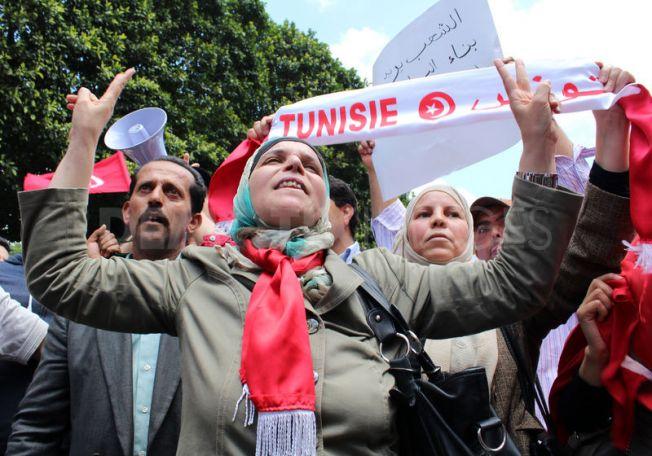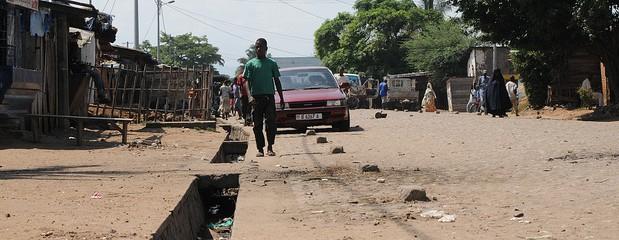Tunis’ post-revolution identity – by Richard Dowden

 On May 1st I took the battered little old train into town to see what was going on. It starts off in one of Tunis’s posher blue and white seaside suburbs, stops at 17 stations – six of them called Carthage – and then whizzes across the causeway that divides the enclosed lake and ends at the base of the capital’s main street, Habib Bourguiba.
On May 1st I took the battered little old train into town to see what was going on. It starts off in one of Tunis’s posher blue and white seaside suburbs, stops at 17 stations – six of them called Carthage – and then whizzes across the causeway that divides the enclosed lake and ends at the base of the capital’s main street, Habib Bourguiba.
I had been warned by a gloomy old Tunisian that the May Day marches might spark a second revolution, so I thought I’d take a look. By mid afternoon, the promenade that divides the main street was packed with people, young and old, many of them carrying Tunisian flags. Most were men (who all dressed in similar drab clothes) – many of the women among them wore headscarves in varying degrees of strictness; some dull and severe, others bright and stylish. I noticed there were also children among them. Clearly not everyone was expecting trouble. The cafes that line the street were packed, hardly a seat to be found.
In the promenade avenue small crowds of 40 or 50 people – rather like at Hyde Park Corner – were trying to listen to a speaker or an argument. Small gangs of police waited at each end of the street but in uniform, not riot gear. Some parts of the street were cordoned off with rolls of razor wire. Behind them were parked armoured Humvees and larger vehicles with water canon.
Earlier in the day two large trade unions had paraded peacefully down the main avenue. Suddenly there were shouts and a crowd of about 150 started to run and scatter into the side streets. The crowd after all was nervous and jittery. But after running a few yards, they turned and waited, then drifted back. It was becoming clear that revolution was not in the air.
On my way back an old man talking on his mobile phone was knocked over by a young man dodging through the crowd, running fast. The phone broke up but immediately people picked up the pieces and went to his help. Two young men took off in pursuit. On the packed train on the way back, a man gave up his seat to a pregnant woman and noisy kids were scolded by their elders. This does not feel like a society that is likely to go further down the revolutionary road.
Tunisians are proud that they sparked the Arab Spring – though the manner of Mohamed Bouazizi’s self immolation in December 2010 was horrific. Now after a free and fair election they have a coalition government led by Ennahda, a moderate Islamic party. They are into process, drafting a new constitution. There are no ongoing street battles of Egypt or the chaos of Libya, Tunisia’s neighbours. Tunisians have done their revolutionary bit and now want a decent process towards greater freedom and a better life. Some are furious that Ben Ali and his family stole so much from the country and ruled it with a secret police. But today words like dignity, freedom and fairness come up a lot. What little violence there has been seems to come from the former secret police, now jobless.
What are the threats to this? One is the economic divide. Tunisia is not Tunis and there are terrible levels of poverty in the south away from the coast. Secondly, there is a feeling that Ennahda is holding back now but if it wins the next election outright it will impose stricter Islamic codes. Already the owner of a TV station has been fined for showing the film Persepolis. Thirdly, only about 25 percent of the 18 to 25 year olds voted in the recent election. Yet it was that generation who put their lives on the line on the streets to drive out President Ben Ali. No one quite knows why they stayed away but if they do not participate in making the new constitution it could be destabilizing at a later stage.
Richard Dowden is Director of the RAS.






